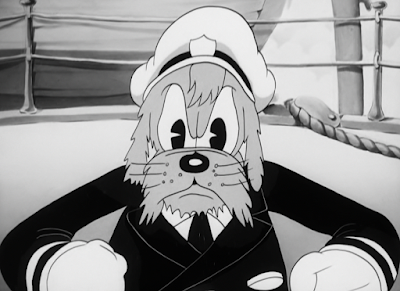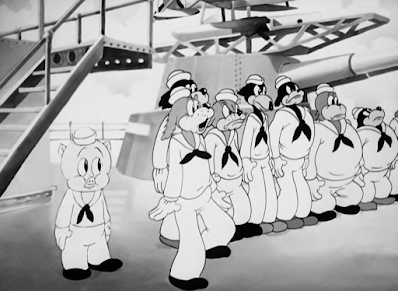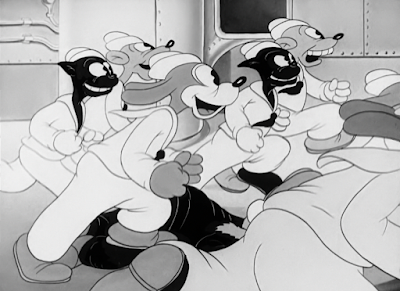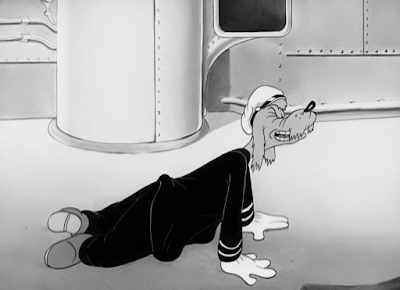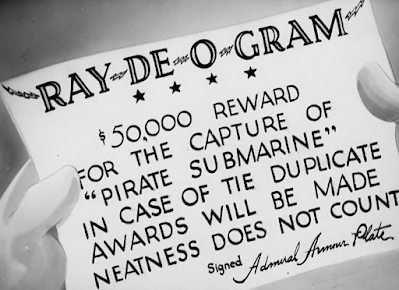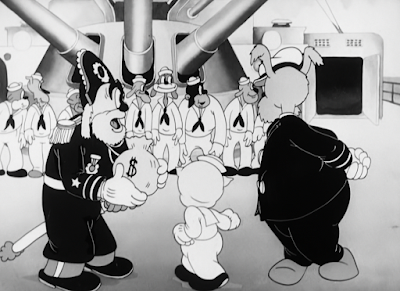Release Date: December 17th, 1938
Series: Looney Tunes
Director: Ben Hardaway, Cal Dalton
Story: Tubby Millar
Animation: Gil Turner
Musical Direction: Carl Stalling
Starring: Mel Blanc (Porky, Captain Skid, Radio, Enemy, Admiral), Danny Webb (Singing Captain Skid), The Sportsmen Quartet (Chorus)
Implementing the arrangement of "The Merry Go Round Broke Down" that would be used all the way up to Joe Glow, the Firefly in 1941, Porky the Gob marks the first joint Ben Hardaway and Cal Dalton effort since Love and Curses in July of 1938.
Interestingly, Porky the Gob borrows extensively from a pre-existing Looney Tune. No, not Buddy the Gob, but rather Little Beau Porky, a rousing 1936 entry from Frank Tashlin. Reusing certain story beats, gags, set-ups, and even lines of dialogue, Gob echoes Beau's sentiment of Porky being the unlikely hero saving the day, this time from an enemy pirate submarine--and for a cash prize!
In a surprise twist, Hardaway and Dalton delve deeper in the theatrics department than normal. Already, the influence of Little Beau Porky asserts itself, whether it be through gags and storyline or cinematography.
Whereas Tashlin's cinematographic touches are typically functional, the opening shot of a dock in the nighttime--while very pretty, with lights reflected upon the water, which is also distorted through means of a distortion glass, the first usage of such we've seen yet--is purely fluff, the transition to day just a little too quick to let the ambience set in. Rather than marking the passage of time, the establishing shot feels a little pompous, as if to say "Look at how fancy we are!" rather than serving a real function at the same time.
Nevertheless, theatrics are welcome in Hardaway/Dalton efforts. The camera trucks in and jump cuts (rather than a dissolve, making it feel slightly jarring) to a dog calling into a trumpet and summoning all the sailors.
Stalling's drumroll crescendo is a nice touch on top of all of the sailors setting off into their boats. There does seem to be a bit of cognitive dissonance in that the sailors here are human, whereas in every other shot of the cartoon, they're portrayed as animals. Perhaps the "funny animal" genre of the '30s was seen as too juvenile, immature for such theatrics? Little Beau Porky asserts otherwise. The effort is certainly appreciated and a very nice change of pace from the usual Hardaway/Dalton set-up, but it does carry a lingering sense of confusion and a lack of conviction, as if they weren't confident enough in their vision to stick to it.
Hardaway/Dalton's montage is hardly close to the excellence of Tashlin's montage in Beau (or other entries, such as Porky's Double Trouble); the transitions are relatively straightforward, as is the staging (save for a nice upward shot of an anchor being hoisted out of the water), and filming the activities of the sailors preparing to head off could be spiced up by double-exposing the action on top of one another to break up the monotony, which is not done.
In a shot of a sailor dog frantically readying the boat's engine, it's obvious that Hardaway and Dalton are itching to get back to their usual shtick, with one of the options on the boat reading "SCRAM". Regardless, almost nobody's montages were as good as Frank Tashlin's, and the Hardaway and Dalton unit was undoubtedly the unit on the lowest rung of the ladder at the time. To expect Tashlin-esque quality from them (harsh as it may be) is a fruitless venture, but it's certainly nice to see them try. And, regardless, the stage and tone is immediately set.
So, with that all in mind, very little time is wasted getting back to the standard Hardaway/Dalton approach, completely unrelated in tone to the opening. Having two contrasting tones is more than fine, but it's exceedingly clear that the theatrics of the opening were unsustainable and that they were itching to return to the corniness standard for the H-D entries.
Regardless, the cartoon's song number of "Song of the Marines" is rightfully catchy. The song is introduced by a chorus of H-D designed sailors, gleefully singing outside the windows of their ship.
Enter Porky, who even gets his own stuttering solo. There have been a few jokes prior about Porky and his struggle to sing (such as the brilliant opening to Porky's Poppa, where he resorts to putting his voice on a record so he doesn't stutter... and promptly smashes the phonograph to the ground when the record begins to skip), but Porky the Gob debuts a musical gag I'm rather fond of, in which Carl Stalling's music score stutters along with Porky. Therefore, the same four notes repeat over and over again as Porky stammers "Nobody eh-nuh-eh-neh-eh... Nobody eh-nuh-neh-neh... Nobody neh-neh-nehh... Nobody eh-nuh-neh-eh-neh-nn-knows where or eh-weh-wee-when..."
Outside of Porky's stuttering lies a visual gag via composition. When the camera first cuts to him, we find that he's happily rowing along in a rowboat. The camera then trucks out to reveal that he's actually exercising on a rowing machine on the Navy ship. Corny, but relatively inventive.
Hardaway and Dalton realized they could get a lot of mileage out of Porky's stutter involved with song (and they were right), which is why Porky continues to struggle, performing a rather sluggish and too-deliberate bait 'n switch as he stammers "We're muh-me-moo-moo-uhhh-ehhhh--puh-ehh--push--eh-muh-eh-moo-moo-ehhh--shovin' right off again!"
The vocal direction in the H-D efforts has always been particularly shoddy, and the tendency to stretch out jokes much longer than they need to be does Blanc no favors. Stalling's music score is the most amusing part of the gag--Porky's stuttering feels much too mechanical and deliberate and slow, which is furthered by his voice not being properly sped up (which happens relatively often in instances where he's singing; his song number in Ali-Baba Bound is completely un-sped and he only stutters once).
Regardless, it's unlikely theater patrons in 1938 would have yelled at the screen "That's not how he stutters!", and is purely my own nitpicking out of a too fervent attachment to the character. In fact, a review for the cartoon in 1938 from The Film Daily claims "Porky's speech impediment, and the Old Sea Dog Captain's antics are the amusing highlights," in regards to the film, almost certainly referring to the scene above.
Regarding "sea dogs", a peculiarly dated in design dog waves a pair of naval signal flags. In a gag that would be reused verbatim in Bob Clampett's Pilgrim Porky, a wave splashes the sailor; once the waters depart, a smiling, actual Navy seal waves the flags instead.
The captain of the ship, a shaggy dog whose nameplate brands him as "Capt. Skid", interjects his own deep voiced, frog throated solo, clearly by someone who is not Mel Blanc. It sounds suspiciously like Poley McClintock's own frog voiced musical solo in Katnip Kollege, which Cal Dalton (along with Cal Howard) directed.
While crude in the character design compartment, the highlight of the song number comes from the very end. As a trio of singing dog sailors sing the final chorus of "We're shovin' right off for hooo-ooome," their "home" is sung in a slide, with the sailors sliding along the deck of the ship, struggling to remain upright. The final chorus is song as the sailors are unceremoniously dumped into the ocean.
The song number is certainly whimsical, if nothing else. Though laden with the corny, comic sensibilities of Hardaway and Dalton, it does contrast greatly with the cinematic opening of the cartoon. It's certainly unrealistic to expect the remainder of the cartoon to be that theatrical (especially from Hardaway and Dalton), but the opening to Conrad the Sailor, the same song sung in the same key, asserts that the "funny animal" designs can be used to remain theatrical and lighthearted at the same time. Here, one feels H-D itching to return back to "normal" and sling as many cornball jokes as possible to compensate for the straightforward delivery of the opening.
With that, we segue to the body of the cartoon, Captain Skid hard at work as he sleeps in his captain's quarters.
The reveal of the gag (Skid's snoring blowing the socks off his feet and back again) is certainly dated and routine, but benefits from the format of a truck out and reveal rather than just establishing the gag in a wide shot as is.
A plume of water splashes Skid awake from the open window with some relatively floaty timing on the impact. For a few frames, Skid's legs disappear entirely--which isn't the last time that such occurs in this cartoon.
Awake and raring to go, Skid defaults into "batten down the hatches" mode, spewing orders left and right as he rouses himself from the bed. Like the timing for jokes, the timing of the animation is sluggish and suffers from chronic floatiness, which is especially damaging for a scene intended to be alarming and energetic. Blanc's vocals of "Man overboard! Man uhhh.. CLEAR THE DECKS!" is certainly energetic, but doesn't coincide with the pacing of the scene nor animation.
Typical for scenes such as these, the joke goes on for much too long, with Skid aimlessly pacing around at a relaxed pace rather than running around and reflecting the urgency of his voice. Blanc's barks of "Avast, ye swabs! ALL HANDS ON DECK! FULL SPEED AHEAD! EASE THE WHEEL! CALL OUT THE GUARD! STAND BY!" are really the only thing holding the scene together.
One genuinely amusing portion of the scene suffers from being drawn out a little too long, as well as very unappealing draftsmanship. Skid walks (rather than runs) over to Porky as he screams "BATTEN DOWN THE HATCHES! BATTEN DOWN THE HATCHES!"
Porky, dutifully doing as such, gives a salute as he retorts "Sir, the hatches are buh-be-be-buh-beh-battened down!" The drawings of Porky in this scene are particularly ugly; at one point, his right ear is right next to his cheek, and he's drawn with a neck--a very thick one at that--rather than tapering the body off. Though admirable in the pursuit to give him some more depth as he stutters with various head jerks and tilts, it instead comes off as incredibly ugly and sloppy. Porky looks very frumpy and stocky, his body rectangular and stiff rather than the usual round, pear shaped construction.
In any case, the point of the gag that actually does get some laughs is Skid's furious screech of " WELL, BAT 'EM DOWN AGAIN!!"
Unfortunately, Hardaway and Dalton don't know where to stop, and instead unnecessarily draw out the gag by having Skid tack on "I'll teach those hatches!" as he marches over to bark more orders.
"S.O.S.! DIM YOUR HEADLIGHTS!" While one of the sailors dozes in a nearby hammock, Skid attempts to gain the crew's attention by blowing on a whistle.
No dice. With no sound coming out, Skid slams the whistle to the ground and instead grabs the arm of the sleeping sailor, whistling with his fingers instead. Having the whistle be an actual, instrumental whistle and not one made through the mouth compliments the gag nicely. May as well go the whole nine miles.
Here is where the Little Beau Porky gets a little (or a lot) more obvious. A nice aerial shot of the sailors getting into place is soon interrupted by a close-up of Skid eyeing down the sailors, giant pie eyes right next to the camera.
Directly borrowing from Beau, Skid barks "Porky Pig!" The camera then cuts to the aligned sailors, everyone in place except Porky. Whereas in Beau, the commander's barks of the same "Porky Pig!" had a long, comic pause in between, with Porky still standing at attention but just utterly clueless to what's going on around him. Here, the pause between the two demands for Porky is much too short, as if they were afraid of committing to a comedic pause, fearing the audience wouldn't get it. Hardaway drags out his humor as a default, and paces it too quickly in instances where it does require dragging out.
In any case, Porky dutifully zips into place, much cuter and boyish than his appearance in his previous scene.
A re-use of the same shot with Skid eyeing down the sailors, now with an uncomfortably long pause as his pupils dart back and forth for good measure.
"SOUND OFF!"
The next gag is peak Hardaway and Dalton and perfectly illustrates what they find funny. Porky's "Wee-weh-weh-one," is relatively unassuming before segueing into a very odd playful cadence from the sailors. Each sailor steps forward, marching in time to the rolling drum score in the background, each interjecting a very cloying chorus of "Two! Oh, buckle my shoe!" "Three, four!" "Shut the door!" "Five-and-a-six," "Pick up sticks!"
Rather than reading as purposefully childish, where the humor should lie, the joke just reads as childish and annoying period, lacking the snappy bite that would be present in, say, a Tex Avery rendition of the same gag. Rather than "Oh, look at how immature and funny these guys are!", the scene seems to implode on itself and deliver the very thing it's trying to make fun of.
Which, as a result, is why Skid's "QUIET!" and domino effect of smacking everyone in the face is so rewarding. While it's not a major detriment, it is fascinating to realize that the incidental characters have very little continuity between scenes; there are new characters added and positions swapped and no consistency whatsoever. Thankfully, the black and white color palette does mask the error.
A shoving of the hat over his eyes and a sticking out of the bottom lip assert an authoritarian note of finality.
Hardaway and Dalton weren't immune from their own variations on the "antiquated meets modern" (or, in this case, "antiquated meets screwball") gag setup. Here, a monkey sailor adjusts the setting on his bugle from taps--who died?--to mess [hall], signaling that it's now lunchtime.
In another attempt at Avery-esque humor, Captain Skid taunts "LAST ONE IN THE MESS HALL'S A SOOOOF-TIEEEE!" He winds up to get a running start...
...and is promptly bulldozed by his own crew. A relatively nice, refreshing bit of snappier timing on the horde of sailors.
More excessively drawn out timing as Skid puts his leadership position into power, barking a very long "COMPANYYYYYYYYYYYYYYYYYYYYYY HALT!"
Captain's orders. The sailors freeze in their positions (though there's a slight bit of time allocated for them to move into said positions, rather than freezing on the current frame, which would have been snappier.) Humming nonchalantly, the captain struts along past the droves of sailors.
Rather than continuing his pompous strut off-screen, the captain instead turns to glower at the sailors for a few more beats before departing. Thus, the race ensues.
Wipe to yet another incredibly attentive sailor, dozing at his post in the radio room. He too is jolted awake by a transmission. Quickly, he translates the morse code beeps onto the typewriter.
More floaty, difficult to concentrate on timing as Skid enters the radio room, hamburger in hand. The pose he strikes as he bites into the hamburger, leaning against the desk, is nice, as well as his gruff, almost dismissive "What do they say!?"
Without waiting for an answer, he rips the page off the typewriter and reads it for himself.
More Hardaway-isms are asserted by the telegram (er, Ray-De-O Gram), promising a $50,000 reward for capturing a pirate submarine--"neatness does not count". The sign-off of "Admiral Armor Plate" is undoubtedly of Hardaway's input, aligning with his writing style for Warner's, but particularly at Walter Lantz with the Woody Woodpecker cartoons, often chock-full of cornpone, uninspired gags of the same nature.
There is, for a change, a nice bit of acting as Skid breathes "50,000!" and counts the amount on his fingers to gauge just how much that equals. A joyous "WHOOPEE!" is exclaimed at the prospect. With that, more nonsensical orders are barked.
Reusing a shot from the beginning of the short, the same trumpeting dog once again blows into the bugle, calling all of the sailors to take arms--yet another similarity to Little Beau Porky. All of the sailors pile onto seaplanes, rifles at the ready and preparing to head into battle. Porky also engages for combat.
That is, until he's thrown out of the plane unceremoniously (again parodying Beau) with a not-so-friendly "GIT OUT!" from Skid. But, rather than giving any sort of explanation as to why Porky is barred from participating (such as the commander in Beau barking "We need MEN, not camel scrubbers!"), the Captain's reasoning is merely "YOU'RE ROCKIN' THE SHIP!"
The door is slammed only briefly in Porky's face before Skid opens the door to add an unnecessary alteration of Jimmie Fidler's catchphrase: "And I DOOOO mean ROCKING!" His open mouthed, wide eyed "winks" to the camera (just furious blinking) read as more self-congratulatory and unnecessary than actually funny.
Like he did in Beau, Porky begins to sulk, dejectedly kicking a bucket as he grumbles about his mistreatment. "Who-who d'they think they are?"
Porky vows to take action by threatening to eh-ceh-qui-eh-ceh-ceh-ee-qui-eh--desert, sulking on a nearby stack of life preservers. He certainly reads as much more childish and adolescent than in Beau, where he remarks he'd "rather be a camel scrubber than an old jingle-bell General", calling the enemy of that cartoon a sissy and threatening to "punch him in the jaw".
Here, Porky makes no such threats. He is an incredibly easy character to feel sympathetic for, yet doesn't give much reason to feel sympathy here. Perhaps it's because the cartoon has spent so much time cramming in corny sailor gags rather than focusing on Porky being mistreated because he got yelled at once or twice, but he comes off like a whiny kid rather than an earnest yet befuddled guy just trying to get by.
His delivery of "I don't like this this eh-nuh-neh-eh-Navy stuff anyhow," makes the perfect case as to just how poor the voice direction in the H/D cartoons can be. It's not Blanc who's at fault, but poor voice direction can often be lethal even with the most talented of voices. Here, it sounds more like "I don't like this eh-nuh-neh-eh-Navy stuff.............,anyhow!", like the "anyhow" is a part of a totally different sentence. The H/D Porky does have a tendency to sound whiny and juvenile in a way that's annoying rather than endearing, which is a shame.
In any case, we segue to the villain, marked by a submarine telescope cutting through the ocean waters. Classic H/D corniness as a windshield wiper reveals a pair of glowering eyes from beneath the sub.
The captain of the enemy pirate ship hardly looks nefarious outside of his pencil thin mustache and bulbous nose. Regardless, H/D get a little more theatrical again as the camera cuts to the captain's view from the telescope, with distortion glass ripple effects on a painting of the Navy ship Porky is on.
With a nefarious chuckle, the captain innocently whistles "My Bonnie Lies Over the Ocean" as he struts over to a nearby missile. In a Tex Avery-esque move, the captain pulls out a lever and lets go, letting the missile blast in the manner of playing a game of pinball.
It would have been amusing to see the entire pinball shtick realized, with the missile plunking back and forth between various buoys and hitting the ship (or somehow reaching a tilt), but instead its arrival is much more drawn out: a robot hand stamps a target onto the side of the Navy ship, allowing the bomb to back up and then strike the ship.
Due to a lack of hook-up poses, the next cut to Porky lying on deck as debris rain upon him reads as jarring; cutting to the aftermath of the explosion with debris raining is fine, but in this case, not enough time is allocated for it to transition smoothly.
Regardless, Rod Scribner animates the scene of Porky recognizing the pirate sub and scrambling to action. Ironically, his distorted animation, rife with wrinkles and wide eyes, as well as relatively weightless running animation, is one of the most appealing scenes yet. Even when he was just starting out as an animator, his trademark off the wall distortion animation is easily recognizable, even in its baby stages.
There appears to be a lack of communication between the two adjoining scenes; Joe D'Igalo animates the next scene, recognizable from his even, floaty yet quick timing and the manner in which he draws Porky's mouth, and rather than running into frame to match Porky's exit in the previous cut, Porky merely walks along at a leisurely pace.
In any case, Porky approaches a nearby cannon and deploys it with the same leisurely pace that he entered the scene; no scramble or urgent sense of danger, despite the frenzied, adventurous music score.
Rather than an opportunity to showcase some exhilarating adventure, H/D go for corny carnival gags. Porky fires a cannon, prompting a cannon ball to fire over the horizon of the ocean. The ding of a bell marks a hit.
Which is why he's then rewarded with a cigar via an extendable hand, a nod to old carnival games such as the strength tester which would give out cigars as a reward. The confused glance Porky directs towards the cigar in his pocket is funnier than the gag itself.
Nevertheless, the carnival games continue, and when Porky misses the second shot, the extendable hand reaches in frame to revoke the cigar from him.
Only then does Porky display any real sense of urgency, now firing the cannon repeatedly. The camera alternates between a close-up of an enemy pirate firing at the Navy ship and a wide shot of both ships at once. Once the camera fixates on the pirate, it is then that a cannonball actually does any real damage.
Instead of blowing up the sub, however, the only thing that's scathed is the pirate's cannon, much to his chagrin. Instead, he opts to fish out a slingshot and use the wad of gum in his mouth as ammo.
An off-kilter but potentially fun gag suffers from very sloppy animation and timing; the gum doesn't read as elastic, and instead looks like a disgusting blob of goo gumming up Porky's cannon... which, it is.
In any case, the pan left to Porky is a relatively creative shot, maintaining the flow of the sequence as Porky fires. The ambiguous ball-of-whatever fires, but, thanks to its elasticity, is sent hurtling back into the cannon and prompting it to explode.
Cue a slightly too long shot of Porky sitting dazed in the wreckage.
Meanwhile, another one of the pirates resorts to gunfire, prompting Porky to narrowly dodge the spray of bullets.
In yet another Tex Avery-esque twist, Porky takes refuge in a nearby wing of the ship. As such, bullets pierce through the windows, each bullet hitting a tile diagonally. "BINGO" reads on the broken tiles, and where a triumphant fanfare would have been included in a Tex Avery demo of the same gag (such as Little Red Walking Hood), the gunfire and frenzied music score merely continue on.
Regardless, Porky is granted at least one act of heroism. As the pirates exit the sub and climb aboard the ship, Porky, in all of his cliched sea epic glory, sends them flying by kicking them all in the face via rope.
The timing is thankfully snappy and elevated by the smacking sound effects, but immediately contradicts itself by having Porky take much too long to grab a spare toilet plunger conveniently tied to a rope. Throughout the fight, the sense of urgency and exhilaration exceedingly present in the climax of Little Beau Porky is nowhere to be found.
Nevertheless, Porky successfully saves the day by using the plunger as a means to snag ahold of the pirate sub and crank it aboard the ship. Note the layering issue on the cels: Porky's cel is below the cel of the ship's railing.
Cross dissolve to Porky getting his $50,000, presented to him by a Navy captain. It seems the crew has returned, and Captain Skid is all smiles, a much different attitude than the one he had a few minutes ago. And, as his legs were cut off at the beginning of the short, he momentarily loses his feet altogether.
"Porky Pig, in behalf of the Navy, I take pleasure in presenting to you..."
Familiar strains of a bugle cry interrupt the captain from his speech. Lunchtime.
Just like before, Captain Skid barks "LAST ONE IN THE MESS HALL'S A SOOOOOF-TIEEEE!"
With refreshingly sharp timing, the entire crew zip as fast as they can off-screen and into the mess hall. Porky's prize lays deserted on the deck of the ship.
...if only for a few seconds.
With many of its influences rooted in Little Beau Porky, this short in particular is a great case study on where and how Hardaway and Dalton shorts try and fail. The tendency to draw out jokes much longer than necessary and thusly squander something that has potential to be funny, unfunny jokes to begin with, poor pacing and comedic timing, poor voice direction, and poor draftsmanship, all aspects that tend to plague H/D efforts to begin with, are very noticeable in this short.
It's unfair to hold Porky the Gob to the same standard of Beau, because Frank Tashlin was an expert in filmmaking and a much deeper knowledge of cinematography than Hardaway and Dalton. Having better animators certainly helps too. It is astounding, though; Beau--a short from 1936 that is plagued by racist caricatures and didn't have the benefit of Mel Blanc, trying to work around Joe Dougherty and his natural stutter and the issues therein--somehow manages to be much less outdated than Gob. Beau's timing and pacing is impeccable, and there are some genuinely funny jokes and even lines from Porky himself (such as Porky threatening to punch the enemy in the jaw, seeing a poster of said enemy, getting scared and barricading the door shut, and then, addressing the poster, "I wasn't sc-sc-scared! I just felt a druh-druh-draft.")
While these directors are constantly borrowing and taking inspiration from each other, reusing dynamics and even pieces of animation, it is amusing to see lines of dialogue lifted straight from another short.
Gob isn't completely terrible, but mainly feels very monotonous and, to a small degree, frustrating. However, hindsight bias makes it incredibly easy to dismiss it as such. Then again, Beau came before it and excelled in everything Gob did not. In any case, the opening song number is catchy, Blanc's deliveries as Captain Skid in particular are rife with energy, and its playfulness--poorly delivered as it is--is hard to dismiss. H/D efforts almost tend to work better with standalone characters; it becomes too easy to fall into the trap of holding up Porky's existing filmography and asking why this one seems to poor in comparison, but there is validity in such a question.
While I wouldn't be eager to recommend Gob, there is merit in watching it for yourself and assessing everything stated above. Watching poorer shorts such as these certainly allow for a greater appreciation of those that are good.
Enjoy! It's also available on HBO Max.









































